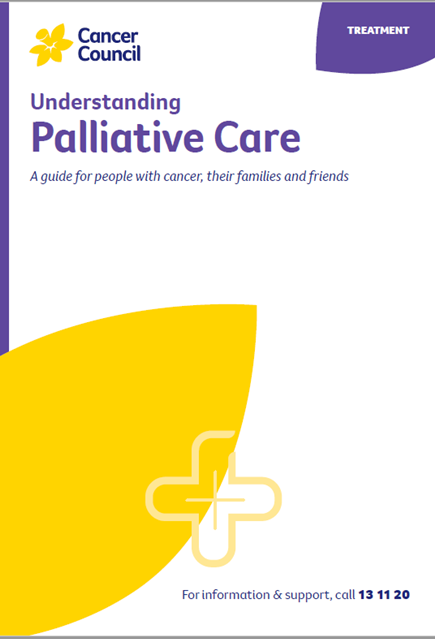- Home
- About Cancer
- Advanced cancer
- Palliative care
- What is palliative care?
What is palliative care?
Palliative care can help people with a progressive, life-limiting illness to live as fully and comfortably as possible.
Learn more about:
- The role of palliative care
- Where will I receive care?
- Who provides care?
- What types of care are available?
- Video: What is palliative care?
The role of palliative care
The main goal is to maintain your quality of life by identifying and helping you with any physical, emotional, cultural, social and spiritual needs. Because everyone is different, palliative care needs vary from person to person. You can continue to have cancer treatment while you are also having palliative care. Starting palliative care may improve your quality of life and also be helpful to your carers or family.
Where will I receive care?
Palliative care may be given at home, in a hospital, in a palliative care unit (which may also be called a hospice), in a residential aged care facility or through community-based palliative care providers.
Who provides care?
Most often, your general practitioner (GP) or a community nurse will organise and coordinate your palliative care. But sometimes this role may be done by a palliative care doctor at a hospital. Doctors (including GPs and other specialists), nurses, nurse practitioners, physiotherapists, occupational therapists, social workers, spiritual care practitioners, volunteers and carers are just some of the people who often deliver palliative care. Together, the people who look after your palliative care are called your palliative care team.
Palliative care takes a person-centred approach. This means treating you in the way you’d like to be treated; listening to your needs, preferences and values, as well as the needs of your family and carers; and involving you in planning your treatment and ongoing care.
What types of care are available?
Palliative care offers a range of care and support options that can be tailored to meet your individual needs in 5 areas.
Physical needs
You may need relief of symptoms such as pain, breathlessness, nausea, restlessness and constipation or help with medicines. Palliative care practitioners can help you with moving around or they may suggest changes around the house to make things easier and safer for you. You may be offered a referral to services that give your carer a break for a short period of time (respite care).
Emotional needs
Palliative care can offer support for you, your family and carers to talk about the changes advanced cancer brings or other sensitive issues. You may also need help to decide what’s important to you, and to plan for your future care and where you would like to receive it. You can seek help to work through feelings with a counsellor or psychologist.
Cultural needs
Palliative care ensures that the care and conversations that you have are sensitive to your culture, ethnicity, background, beliefs and values.
Social needs
You can find help to achieve your goals and get the most out of each day through palliative care. It looks at your day-to-day needs, such as living arrangements, transport to medical appointments, meals, advice on financial issues or help to set up a support network.
Spiritual needs
This support may come from religious leaders you know (e.g. a pastoral carer or chaplain), or it may be available from spiritual care practitioners, or other professionals on the palliative care team.
Video: What is Palliative Care?
Watch this video to see how palliative treatment aims to manage symptoms and improve people’s quality of life without trying to cure the disease.
→ READ MORE: How palliative care works
Podcast for people affected by advanced cancer
Listen now
More resources
Prof Meera Agar, Palliative Care Physician, Professor of Palliative Medicine, University of Technology Sydney, IMPACCT, Sydney, NSW; Anne Booms, Nurse Practitioner, Palliative Care, Icon Cancer Centre Midlands, WA; Nicola Champion, Consumer; John Clements, Consumer; Dr Alexandra Clinch, Palliative Medicine Specialist and Deputy Director, Palliative Care, Peter MacCallum Cancer Centre and Royal Melbourne Hospital, VIC; A/Prof Jaklin Eliott, School of Public Health, University of Adelaide, SA; Dr Jemma Gilchrist, Clinical Psychologist, Mind My Health, NSW; McCabe Centre for Law and Cancer, VIC; Caitlin MacDonagh, Clinical Nurse Consultant, Palliative Care, Royal North Shore Hospital, NSW; Dr Roya Merie, Radiation Oncologist, Icon Cancer Centre, Concord, NSW; Dr Deidre Morgan, Research Centre for Palliative Care, Death and Dying, Flinders University, SA; Caitriona Nienaber, 13 11 20 Consultant, Cancer Council WA; Palliative Care Australia.
View the Cancer Council NSW editorial policy.
View all publications or call 13 11 20 for free printed copies.

